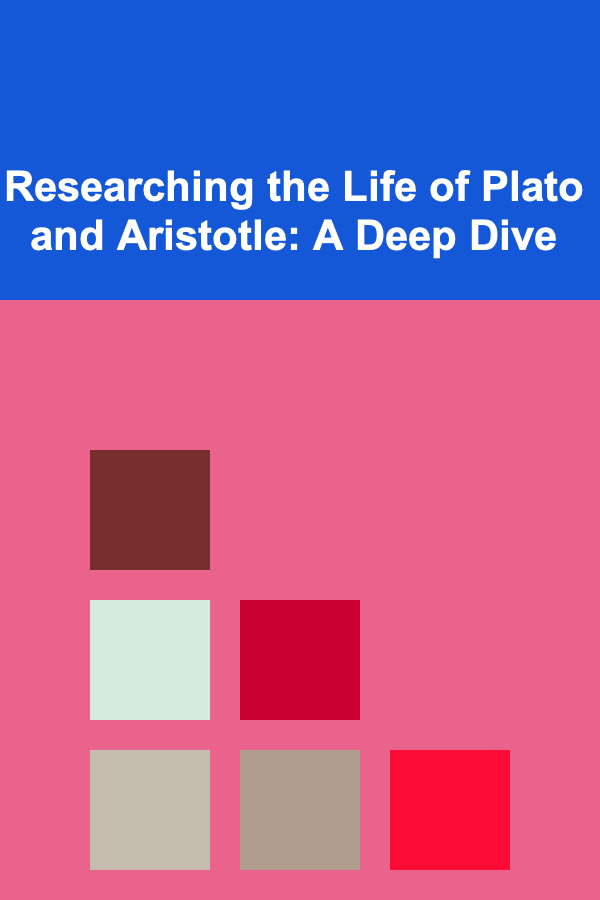
Researching the Life of Plato and Aristotle: A Deep Dive
ebook include PDF & Audio bundle (Micro Guide)
$12.99$7.99
Limited Time Offer! Order within the next:

Plato and Aristotle, two giants of ancient Greek philosophy, have profoundly shaped Western thought for millennia. Their ideas continue to resonate in fields ranging from politics and ethics to metaphysics and epistemology. Researching their lives, however, presents unique challenges. While primary texts provide a glimpse into their intellectual development and philosophical positions, biographical details are often intertwined with legend, anecdote, and the interpretations of later authors. A thorough investigation requires a multi-faceted approach, carefully considering primary sources, secondary scholarship, and the broader historical and cultural context.
I. Laying the Foundation: Understanding the Context
Before delving into the specifics of Plato's and Aristotle's lives, it's crucial to establish a strong understanding of the world in which they lived and worked. This includes:
A. The Political Landscape of Ancient Greece
The 5th and 4th centuries BCE were a period of intense political upheaval and experimentation in Greece. The rise and fall of Athens as a major power, the Peloponnesian War (431-404 BCE), the shifting alliances between city-states, and the gradual emergence of Macedonian dominance under Philip II all profoundly impacted the lives of Plato and Aristotle. Understanding the political dynamics helps to interpret their writings on justice, governance, and the ideal state.
Key areas to explore include:
- The Athenian Democracy: Its strengths and weaknesses, the role of citizens, and the influence of demagogues. Plato's critiques of democracy, particularly in the Republic, are directly related to his experiences with the Athenian political system.
- The Peloponnesian War: Its impact on Athenian society and the political instability that followed. This war likely shaped Plato's disillusionment with Athenian politics and his search for a more just and stable form of government.
- The Rise of Macedonia: Philip II's military and political strategies, and the subsequent conquests of Alexander the Great. Aristotle's connection to the Macedonian court as Alexander's tutor is a significant aspect of his biography.
- Key Figures: Pericles, Socrates, Alcibiades, Thucydides, Lysander, and other prominent political and military leaders of the era.
B. Athenian Society and Culture
Beyond politics, understanding the social and cultural norms of Athens is essential. This includes:
- Social Classes: The divisions between citizens, metics (resident aliens), and slaves. Plato's and Aristotle's views on social hierarchy and the roles of different classes within society.
- Education: The traditional Athenian education system, including rhetoric, music, gymnastics, and philosophy. The influence of sophists on Athenian intellectual life.
- Religion and Mythology: The role of the Olympian gods and other religious beliefs in Athenian society. The relationship between philosophy and traditional religion.
- Family and Gender Roles: The structure of Athenian families and the limited role of women in public life. Plato's more egalitarian views on gender roles in the Republic stand in contrast to the prevailing social norms.
- Art and Architecture: The artistic achievements of the period, including the construction of the Parthenon and the development of classical sculpture.
C. Intellectual Currents: Pre-Socratic Philosophy and the Sophists
Plato and Aristotle did not emerge in a vacuum. They were deeply influenced by the philosophical traditions that preceded them. Understanding pre-Socratic philosophy and the Sophists is crucial for grasping the context of their own thought.
- Pre-Socratic Philosophers: Figures like Thales, Anaximander, Heraclitus, Parmenides, and Empedocles, who explored questions about the nature of the universe, change, and reality. Plato and Aristotle engaged with these earlier theories in their own philosophical investigations.
- The Sophists: Protagoras, Gorgias, and other teachers of rhetoric and argumentation, who emphasized relativism and the importance of persuasive speech. Plato's critique of the Sophists is a central theme in many of his dialogues.
- Socrates: Plato's teacher and the central figure in his dialogues. Socrates' method of questioning, his emphasis on virtue and knowledge, and his trial and execution profoundly influenced Plato's philosophical development. It is important to distinguish the historical Socrates from the Socrates portrayed in Plato's writings, a task requiring careful textual analysis and consideration of secondary scholarship.
II. Primary Sources: The Writings of Plato and Aristotle (and Their Contemporaries)
The most important sources for researching Plato and Aristotle's lives are their own writings. However, these texts are primarily philosophical treatises, not autobiographies. Extracting biographical information requires careful reading, interpretation, and a critical awareness of the genre and purpose of each work.
A. Plato's Dialogues
Plato wrote exclusively in the form of dialogues, featuring Socrates as the main protagonist in most cases. These dialogues are not simply records of actual conversations; they are carefully crafted literary and philosophical works. While they offer insights into Plato's own philosophical development and his relationship with Socrates, they must be approached with caution as biographical sources.
Key dialogues for biographical research include:
- The Apology: Plato's account of Socrates' defense speech at his trial. While not necessarily a verbatim transcript, it provides insights into Socrates' character, beliefs, and his conflict with Athenian society.
- The Phaedo: A description of Socrates' last hours in prison, including his discussion of the immortality of the soul. Offers a glimpse into Plato's own views on death and the afterlife.
- The Seventh Letter: A letter attributed to Plato that discusses his political experiences and his disillusionment with Athenian politics. Its authenticity has been debated, but if genuine, it provides valuable autobiographical information.
- The Republic: While primarily a work of political philosophy, it contains insights into Plato's views on justice, education, and the ideal state, which may reflect his personal values and aspirations.
- Other Dialogues: Dialogues like Crito, Euthyphro, Protagoras, Gorgias, Meno, Symposium, and Theaetetus all contain glimpses of Plato's philosophical development and his interactions with other thinkers of his time.
When analyzing Plato's dialogues, consider the following:
- The Dramatic Date: The historical context in which the dialogue is set. Understanding the political and social climate of the time can shed light on the themes and arguments presented in the dialogue.
- The Characters: The roles and perspectives of the different characters in the dialogue. Pay attention to how Plato portrays Socrates and other figures.
- The Arguments: The philosophical arguments presented in the dialogue. Analyze the logic and coherence of these arguments, and consider their implications for Plato's own philosophical views.
- The Literary Style: Plato's use of imagery, metaphor, and other literary devices. Consider how these devices contribute to the overall meaning of the dialogue.
- Interpretations: Be aware of different interpretations of Plato's dialogues. Consult secondary scholarship to understand the range of perspectives on Plato's thought.
B. Aristotle's Writings
Aristotle's writings are more systematic and less overtly literary than Plato's. He wrote on a wide range of subjects, including logic, physics, metaphysics, ethics, politics, and rhetoric. While his works do not offer the same kind of personal insights as Plato's dialogues, they provide valuable information about his intellectual development, his philosophical positions, and his relationships with other thinkers.
Key works for biographical research include:
- Nicomachean Ethics: Aristotle's treatise on ethics, which explores the nature of happiness, virtue, and the good life. Offers insights into his moral philosophy and his views on human nature.
- Politics: Aristotle's treatise on political philosophy, which examines different forms of government and the ideal state. Reflects his observations of various political systems and his views on citizenship and justice.
- Metaphysics: Aristotle's treatise on the fundamental principles of being and reality. Provides insights into his philosophical system and his relationship to Plato's theory of Forms.
- Physics: Aristotle's treatise on the natural world, which explores topics such as motion, change, and causality. Demonstrates his scientific interests and his method of empirical observation.
- Rhetoric: Aristotle's treatise on the art of persuasion. Provides insight into his understanding of human psychology and communication.
- The Constitution of Athens: A historical account of the Athenian constitution, attributed to Aristotle. Provides valuable information about Athenian political institutions and history. Its authenticity was disputed for centuries, but its rediscovery in the late 19th century confirmed its Aristotelian authorship.
When analyzing Aristotle's works, consider the following:
- The Purpose of the Work: Aristotle's intended audience and the specific questions he is addressing.
- The Method: Aristotle's method of argumentation, including his use of definitions, distinctions, and logical reasoning.
- The Relationship to Plato: Aristotle's engagement with Plato's philosophical ideas. Identify points of agreement and disagreement between the two thinkers.
- The Influence of Empirical Observation: Aristotle's reliance on empirical observation and scientific inquiry. His approach to studying the natural world and human society.
- The Terminology: Aristotle's specialized vocabulary and his use of technical terms. Consult dictionaries and commentaries to understand the meaning of these terms.
C. Contemporary Accounts and Testimonials
Beyond the writings of Plato and Aristotle themselves, there are a few contemporary accounts and testimonials that offer insights into their lives and characters. However, these sources are often fragmentary and must be treated with caution.
- Xenophon: A student of Socrates and a contemporary of Plato. His Memorabilia and Symposium offer alternative perspectives on Socrates' life and teachings.
- Diogenes Laertius: A biographer who lived several centuries later, but whose Lives of Eminent Philosophers contains valuable information about Plato and Aristotle, based on earlier sources that are now lost. While Diogenes Laertius is not always reliable, he often preserves important anecdotes and traditions.
- Iamblichus: A Neoplatonist philosopher who wrote a biography of Pythagoras. His work also contains some information about Plato's relationship to Pythagoreanism.
- Epistles attributed to Plato: Besides the Seventh Letter, several other letters are attributed to Plato, though their authenticity is highly debated. These letters, if genuine, could shed light on various aspects of Plato's life, beliefs, and relationships.
III. Secondary Scholarship: Navigating the Interpretations
Given the challenges of interpreting primary sources, secondary scholarship is essential for understanding Plato and Aristotle's lives. A vast body of literature exists on these two philosophers, offering diverse perspectives on their thought and their historical context. It's crucial to approach this scholarship critically, considering the biases and agendas of the authors.
A. Biographical Studies
Several biographies of Plato and Aristotle have been written, ranging from popular accounts to scholarly investigations. These biographies attempt to reconstruct the lives of these philosophers based on the available evidence.
Consider the following factors when evaluating biographical studies:
- The Author's Perspective: The author's philosophical and political biases. Does the author have a particular interpretation of Plato or Aristotle's thought that influences their biographical narrative?
- The Use of Primary Sources: The author's reliance on primary sources and their critical assessment of these sources. Does the author provide evidence to support their claims?
- The Engagement with Secondary Scholarship: The author's engagement with other biographical studies and their consideration of alternative interpretations.
- The Scope of the Biography: The focus of the biography. Does the biography focus primarily on the philosopher's intellectual development, their political activities, or their personal life?
B. Philosophical Commentaries and Interpretations
Philosophical commentaries offer detailed analyses of Plato and Aristotle's works, providing insights into their arguments, their influences, and their significance. These commentaries can be invaluable for understanding the complexities of their thought.
Consider the following factors when evaluating philosophical commentaries:
- The Focus of the Commentary: The specific themes or arguments that the commentary addresses.
- The Method of Interpretation: The author's method of interpreting Plato or Aristotle's works. Does the author focus on the historical context, the literary style, or the philosophical arguments?
- The Engagement with Other Interpretations: The author's consideration of alternative interpretations and their arguments against those interpretations.
- The Clarity and Accessibility of the Commentary: The author's ability to explain complex philosophical concepts in a clear and accessible manner.
C. Historical Studies of Ancient Greece
Historical studies of ancient Greece provide crucial context for understanding the lives of Plato and Aristotle. These studies examine the political, social, and cultural institutions of the time, as well as the major events and developments that shaped their world.
Key areas to explore include:
- Political History: Studies of Athenian democracy, the Peloponnesian War, and the rise of Macedonia.
- Social History: Studies of Athenian society, including social classes, gender roles, and family life.
- Cultural History: Studies of Athenian art, literature, religion, and philosophy.
- Intellectual History: Studies of pre-Socratic philosophy, the Sophists, and the development of Greek science.
D. Online Resources and Databases
The internet provides access to a wealth of resources for researching Plato and Aristotle's lives. Online databases, academic journals, and websites dedicated to ancient philosophy can be valuable tools for gathering information and exploring different perspectives.
Useful online resources include:
- The Stanford Encyclopedia of Philosophy: A comprehensive online encyclopedia of philosophy, with detailed entries on Plato, Aristotle, and related topics.
- The Internet Encyclopedia of Philosophy: Another valuable online encyclopedia of philosophy, with articles on various philosophical concepts and figures.
- JSTOR: A digital library of academic journals, books, and primary sources.
- Project Gutenberg: A project that provides free access to electronic texts of classic works, including translations of Plato and Aristotle.
- Perseus Digital Library: A digital library that provides access to Greek and Roman texts, translations, and commentaries.
IV. Methodological Considerations: A Critical Approach
Researching the lives of Plato and Aristotle requires a critical and nuanced approach. Because biographical information is often fragmented, indirect, and intertwined with philosophical interpretations, it's important to be aware of the limitations of the available evidence and to avoid making hasty generalizations.
A. Distinguishing Fact from Interpretation
One of the biggest challenges is separating factual information from later interpretations and embellishments. Many anecdotes and stories about Plato and Aristotle have been passed down through generations, often without solid historical evidence. It's important to critically evaluate these stories and to consider their potential origins and purposes.
B. Addressing Authenticity Concerns
The authenticity of some texts attributed to Plato and Aristotle has been questioned. Scholars have debated the authorship of certain dialogues and letters, based on stylistic analysis, historical inconsistencies, and other criteria. It's important to be aware of these debates and to consider the implications for biographical research.
C. Understanding Bias and Perspective
All sources, both primary and secondary, are subject to bias. Plato's portrayal of Socrates, for example, is likely influenced by his own philosophical agenda. Similarly, later biographers may have had their own reasons for portraying Plato and Aristotle in particular ways. It's important to be aware of these biases and to consider their potential impact on the information presented.
D. Recognizing the Limitations of Evidence
The available evidence for Plato and Aristotle's lives is limited. Much of what we know is based on secondary accounts and inferences drawn from their philosophical writings. It's important to recognize these limitations and to avoid making definitive conclusions based on incomplete or unreliable information.
E. Acknowledging the Philosophical Significance
Ultimately, researching the lives of Plato and Aristotle is not just about uncovering biographical details. It's about understanding the intellectual and historical context in which their philosophical ideas developed. By exploring their lives, we can gain a deeper appreciation for their contributions to Western thought and their enduring relevance to contemporary concerns.
V. Conclusion: A Journey of Discovery
Researching the lives of Plato and Aristotle is a challenging but rewarding endeavor. It requires a commitment to careful reading, critical thinking, and a willingness to engage with diverse perspectives. By drawing on primary sources, secondary scholarship, and a solid understanding of the historical context, we can gain a richer and more nuanced understanding of these two giants of ancient Greek philosophy. The journey of discovery is ongoing, and new insights continue to emerge as scholars re-examine the evidence and offer fresh interpretations.

How to Budget for Interior Renovation Cost Increases
Read More
How to Decorate Your Walls on a Budget
Read More
How to DIY Your Home Decor with Inexpensive Materials
Read More
The Best Websites for Job Hunting: A Comprehensive Guide
Read More
What Techniques Can Help You Create a Clutter-Free Home Environment?
Read More
How to Build a Portfolio Website with Tailwind CSS
Read MoreOther Products

How to Budget for Interior Renovation Cost Increases
Read More
How to Decorate Your Walls on a Budget
Read More
How to DIY Your Home Decor with Inexpensive Materials
Read More
The Best Websites for Job Hunting: A Comprehensive Guide
Read More
What Techniques Can Help You Create a Clutter-Free Home Environment?
Read More